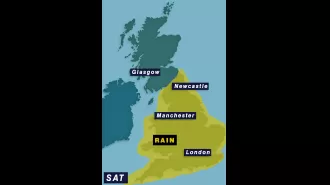Energy costs will remain high as the expected increase in the price cap is likely to take effect in January.
People in need will suffer more and face severe hardship.
November 18th 2024.

Ever since the conflict between Russia and Ukraine erupted, the cost of fuel has remained stubbornly high. Unfortunately, it doesn't seem like it will be going down anytime soon, according to forecasters. Every three months, Ofgem releases the energy price cap, which sets the maximum amount that suppliers can charge for gas and electricity. On January 1st, Cornwall Insight predicted that the cap will increase by £19, resulting in a 1% rise in energy bills from £1,736 to £1,717. This news comes at a particularly unwelcome time, as the UK is currently experiencing a cold snap.
While the increase in the energy price cap may not come as a surprise due to ongoing geopolitical turmoil and extreme weather conditions caused by climate change, it is still disappointing for many households. Craig Lowrey, a principal consultant at a research firm, explains that supply concerns and stable additional charges have kept wholesale energy prices from decreasing. He adds, "While we may have expected this, the news of no relief from the autumn price rises will still be disheartening as we head into the colder months."
However, experts warn that the energy price cap is not enough to protect vulnerable citizens. This cap affects around 27 million households in England, Wales, and Scotland, and is currently in effect from October 1st to December 31st. But even if Cornwall Insight's predictions are accurate, it is unlikely that your yearly energy bill will be exactly £1,717. This is because the cap does not determine the total cost of your energy, but rather the maximum amount that suppliers can charge per kilowatt hour.
The cost of fuel can vary greatly depending on factors such as energy usage, location, and meter type. Cornwall Insight estimates that the unit rate for electricity will be 24.50p per kilowatt-hour, with a daily standing charge of 61p. This standing charge is a fixed fee that is charged every day, regardless of how much electricity is used. For gas, the unit rate is expected to be around 32p. However, Cornwall emphasizes that the energy price cap is expected to decrease slightly in April and again in October next year.
Lowrey believes that the energy price cap, which was first introduced in 2019, is not enough to protect vulnerable households. This is especially concerning as millions of pensioners will not receive the Winter Fuel Allowance this year, which used to provide at least £200 to all individuals over the age of 66. He suggests that alternative options, such as social tariffs and targeted support for those in need, should be considered seriously by the government. He adds, "Inaction is a choice to leave people out in the cold."
As the UK braces for snow, ice, and cold temperatures this week, the National Energy Action director of policy and advocacy, Peter Smith, expresses concern for the most vulnerable citizens. He explains that the current cold spell is already having a devastating impact, and with fewer support options available this winter, many are being forced to ration their energy usage or go further into debt to stay warm. With wholesale prices on the rise, it is not surprising that the cost of energy will remain unaffordable for many. Smith states, "The most vulnerable people will face even more difficulties and acute hardship."
While the increase in the energy price cap may not come as a surprise due to ongoing geopolitical turmoil and extreme weather conditions caused by climate change, it is still disappointing for many households. Craig Lowrey, a principal consultant at a research firm, explains that supply concerns and stable additional charges have kept wholesale energy prices from decreasing. He adds, "While we may have expected this, the news of no relief from the autumn price rises will still be disheartening as we head into the colder months."
However, experts warn that the energy price cap is not enough to protect vulnerable citizens. This cap affects around 27 million households in England, Wales, and Scotland, and is currently in effect from October 1st to December 31st. But even if Cornwall Insight's predictions are accurate, it is unlikely that your yearly energy bill will be exactly £1,717. This is because the cap does not determine the total cost of your energy, but rather the maximum amount that suppliers can charge per kilowatt hour.
The cost of fuel can vary greatly depending on factors such as energy usage, location, and meter type. Cornwall Insight estimates that the unit rate for electricity will be 24.50p per kilowatt-hour, with a daily standing charge of 61p. This standing charge is a fixed fee that is charged every day, regardless of how much electricity is used. For gas, the unit rate is expected to be around 32p. However, Cornwall emphasizes that the energy price cap is expected to decrease slightly in April and again in October next year.
Lowrey believes that the energy price cap, which was first introduced in 2019, is not enough to protect vulnerable households. This is especially concerning as millions of pensioners will not receive the Winter Fuel Allowance this year, which used to provide at least £200 to all individuals over the age of 66. He suggests that alternative options, such as social tariffs and targeted support for those in need, should be considered seriously by the government. He adds, "Inaction is a choice to leave people out in the cold."
As the UK braces for snow, ice, and cold temperatures this week, the National Energy Action director of policy and advocacy, Peter Smith, expresses concern for the most vulnerable citizens. He explains that the current cold spell is already having a devastating impact, and with fewer support options available this winter, many are being forced to ration their energy usage or go further into debt to stay warm. With wholesale prices on the rise, it is not surprising that the cost of energy will remain unaffordable for many. Smith states, "The most vulnerable people will face even more difficulties and acute hardship."
[This article has been trending online recently and has been generated with AI. Your feed is customized.]
[Generative AI is experimental.]
0
0
Submit Comment





